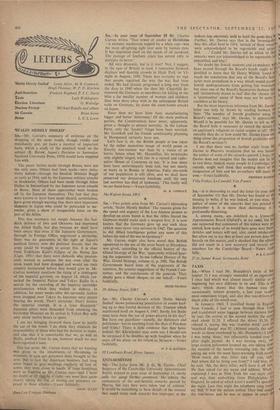SIR,—In your issue of Septernber 18 Mr. Charles Curran writes,
'That tower of smoke at Hiroshima —a monster mushroom topped by a white cap—was the most affrighting sight ever seen by human eyes. It has imprinted itself on the minds of all mankind. The passage of fourteen years has served only to multiply its terror.'
All very dramatic, but is it true? Not, I suggest, in the case of Britain at least. I remember firework displays and dancing crowds in Hyde Park on VJ- night in August, 1945. There was certainly no sign that people regretted the way the war had been ended. We had already progressed a long way from the days in 1940 when the then Mr. Churchill de- nounced the Germans as murderers for killing in the blitz a far smaller number of women and children than were done away with in the subsequent British raids on Germany, let alone the atom-bomb attacks on Japan.
Since then we have been busy manufacturing
bigger and better 'deterrents.' Of the main political parties, the Conservatives have never, apparently, given a thought to atomic morality. In the Labour Party, only the 'lunatic' fringe have been worried; Mr. Gaitskell and his friends comfortably .planning in Hampstead certainly have not.
Let's face it, sir, the British people is less taken
by the rather monotone image of world peace or drearily non-nuclear war than by a vision of an heroic future when Mr. Macmillan, his moustache only slightly singed, will rise in a ruined and radio- active House of Commons to say, 'It is true some lives have unfortunately been lost, but not nearly so many as in Russia or America. Fully one-tenth of our population is still alive, and we shall have preserved our democratic freedoms until the very last survivor has died of leukaemia.' This really will be our finest hour.—Yours faithfully, M. B. CONNOCK
54a Walton Street, SW3


































 Previous page
Previous page